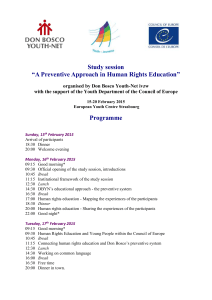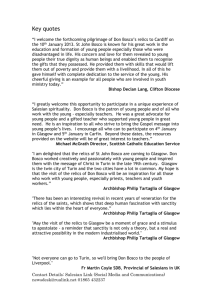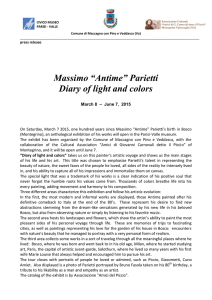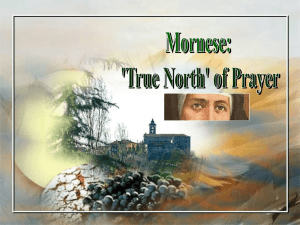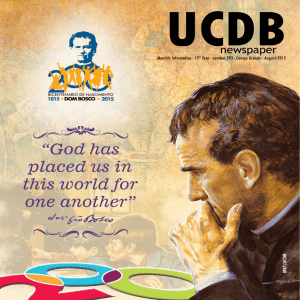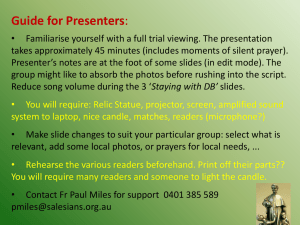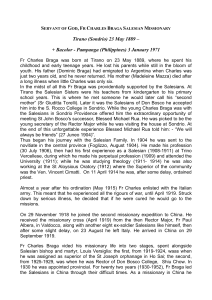It is not enough, however, to reconstruct the ecclesial historical
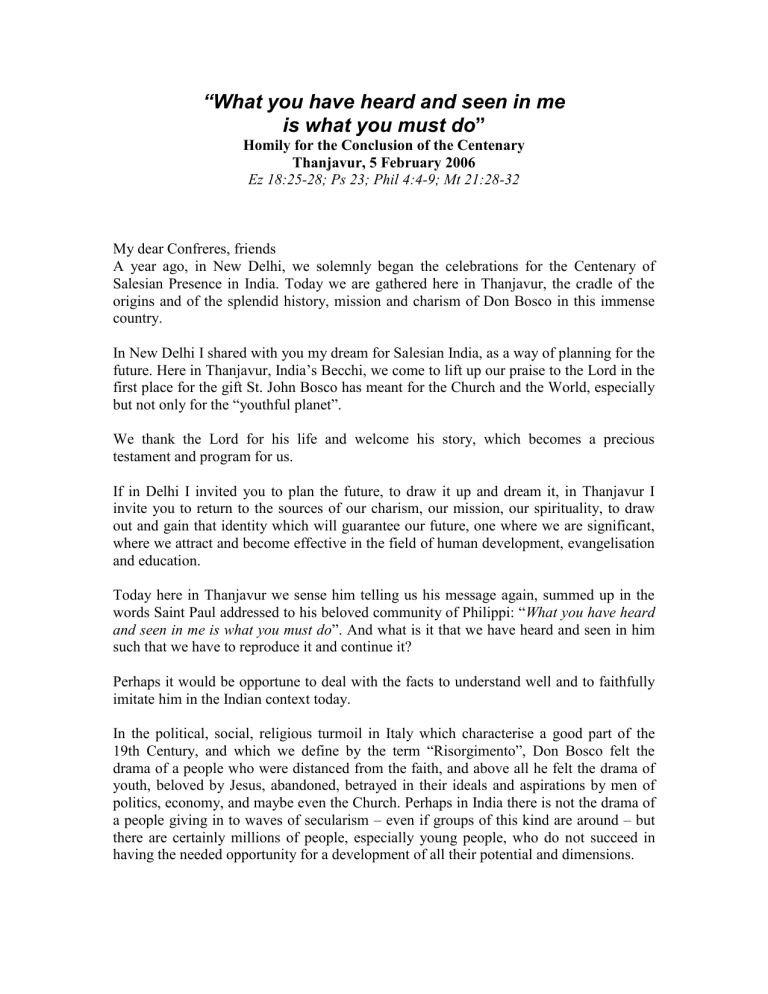
“What you have heard and seen in me is what you must do
”
Homily for the Conclusion of the Centenary
Thanjavur, 5 February 2006
Ez 18:25-28; Ps 23; Phil 4:4-9; Mt 21:28-32
My dear Confreres, friends
A year ago, in New Delhi, we solemnly began the celebrations for the Centenary of
Salesian Presence in India. Today we are gathered here in Thanjavur, the cradle of the origins and of the splendid history, mission and charism of Don Bosco in this immense country.
In New Delhi I shared with you my dream for Salesian India, as a way of planning for the future. Here in Thanjavur, India’s Becchi, we come to lift up our praise to the Lord in the first place for the gift St. John Bosco has meant for the Church and the World, especially but not only for the “youthful planet”.
We thank the Lord for his life and welcome his story, which becomes a precious testament and program for us.
If in Delhi I invited you to plan the future, to draw it up and dream it, in Thanjavur I invite you to return to the sources of our charism, our mission, our spirituality, to draw out and gain that identity which will guarantee our future, one where we are significant, where we attract and become effective in the field of human development, evangelisation and education.
Today here in Thanjavur we sense him telling us his message again, summed up in the words Saint Paul addressed to his beloved community of Philippi: “
What you have heard and seen in me is what you must do
”. And what is it that we have heard and seen in him such that we have to reproduce it and continue it?
Perhaps it would be opportune to deal with the facts to understand well and to faithfully imitate him in the Indian context today.
In the political, social, religious turmoil in Italy which characterise a good part of the
19th Century, and which we define by the term “Risorgimento”, Don Bosco felt the drama of a people who were distanced from the faith, and above all he felt the drama of youth, beloved by Jesus, abandoned, betrayed in their ideals and aspirations by men of politics, economy, and maybe even the Church. Perhaps in India there is not the drama of a people giving in to waves of secularism – even if groups of this kind are around – but there are certainly millions of people, especially young people, who do not succeed in having the needed opportunity for a development of all their potential and dimensions.
Don Bosco reacted energetically to such situations, discovering new ways of fighting evil; he resisted negative forces in society by condemning the ambiguity and danger in the situation - as we have recently seen in the suburbs of Paris and all over France –
“opposing” – which is what he meant in his own way – the strong powers of his own era.
This then was summed up, for developing and empowering them, in the possibilities offered him by the historical-cultural conditions and the economic events of that time in history: the paternalistic social structure of the ancien regime of the Kingdom of Sardinia, the liberal political arrangement open to a decentralisation of charity and philanthropy; the availability of resources for doing charitable works, consensus, despite partial opposition from the ecclesiastical world, from authority and the faithful. Thus he founded oratories, schools of one kind or another, workshops for young workers, newspapers and periodicals, printeries and publishers, religious, cultural, social and recreational youth associations; churches, foreign missions, activities to help migrants, as well as two religious congregations and a lay organisation to continue his work. Look, dear confreres, at the irrepressible creativity and generosity of our beloved father Don Bosco to respond to the huge needs of young people.
He was also successful thanks to his outstanding natural gifts as a communicator, notwithstanding the lack of financial resources (never enough for his accomplishments), his modest cultural and intellectual baggage (at a time when a high theoretical profile was needed to respond), being the child of a theology and a social concept with strong limitations (and therefore inadequate as a response to secularisation and the profound social revolution taking place). Moved always by a superior zeal and faith, in difficult circumstances he asked and obtained help from everyone, Catholics and anticlericals, rich and poor, men and women of means and power, exponents of the nobility, the middle class, clergy high and low. Here then is the source of his exceptional energy: his passion for God and for the young.
Certainly his requests for help could not do other than resound directly or indirectly as challenge, moral condemnation of those who had closed their heart to the painful reality of their neighbour. His was not simply a condemnation, but prophetic and mystic.
It is not enough, however, to reconstruct the ecclesial historical context in which Don
Bosco lived and found himself operating. Even if this is not indifferent, we need to deepen our understanding of the interpretations, precisely because it is there that we discover the great choices he could never give up on. These are the ones we have to take on, make our own and put into practice if we want to be his beloved sons and faithful imitators in India today.
The historical importance of Don Bosco needs to be retraced, not firstly in its many
“works” and in certain relatively original, methodological elements such as the famous
“preventive system of Don Bosco”, but in his great convictions:
in the intellectual and emotional perception he had of the universal, theological and social significance of the problem of poor and
“ abandoned
”, youth, i.e of the enormous proportion of young people not considered or considered badly;
in the intuition of the presence of a strong sensitivity, in the civil and political sectors, to the problem and importance of educating young people, and of his understanding of the more informed sectors and of public opinion;
in the idea he launched of much-needed intervention on a large scale by the Catholic and civil world, as a fundamental necessity for the life of the Church and the survival itself of the social order;
and in the ability to communicate it to large groups of co-workers , benefactors and admirers.
Neither politician nor sociologist, and not a trade unionist ‘ante litteram’, but simply a priest-educator, Don Bosco began from the idea that education could achieve much, in any situation, if carried out with the maximum of good will, commitment and capacity to adapt. He committed himself to change consciences, to form them to human honesty, civic and political loyalty and, in this direction, to "change" society by means of education. This was his choice.
He transformed the strong values he believed in – defending them against everything – into social facts, practical gestures, without withdrawing from the spiritual and ecclesial, understood as a space free from the problems of life and the world. Indeed, strengthened by his vocation as priest-educator he nurtured a daily existence which was not devoid of horizons, but was an incarnate dimension of ideals and values; a dimension that was no protective niche or refusal to openly face up to things, but a sincere measuring against a broader and more diversified reality; a dimension which was not a world restricted to a few needs to satisfy and a place for almost mechanical repetition of traditional attitudes; a dimension which did not refuse every tension, but demanding sacrifice, risk, renunciation of immediate pleasure, struggle. For himself and for his Salesians he had the freedom and the fierceness of autonomy. He did not want to tie his works’ fortunes to the unpredictable vicissitudes of political regimes.
The renowned French theologian, M.D. Chenu, O.P. answering the question of a journalist in the 80’s, last century, who asked him to point out the names of some saints bearing a message current for our new times, said without hesitation: “I am happy to remind you, in the first place, of someone who was a forerunner of the Council a century ago: Don Bosco. He was already, prophetically, a model of holiness for his work which broke with the way of thinking and believing of his contemporaries.”
He was a model for so many; not a few imitated his example, becoming in turn the “Don
Bosco of Bergamo, of Bologna, of Messina so on”.
The person and significance of Don Bosco and his work are historically and universally recognised, pace those who wrote, like the well-known writer Alberto Moravia, that
“saints do not make history”. We need to say with Benedict XVI, in the Homily for
World Youth Day in Cologne, that saints are true revolutionaries, because they are the ones who leaven culture. Obviously the “secret” of his “success” can be found by each person in different facets of his complex personality: An extremely capable innovator of educational works, forward-looking organiser of national and international undertakings,
a very fine educator, great teacher etc.
So, my dear friends, what we have heard and seen in Don Bosco, is what we are called to continue with dynamic fidelity in India. This way we can be “servants, mystics and prophets”, men full of passion for God and passion for the young, with the missionary thrust of the “Da mihi animas”.
To Her given as mother and teacher, Mary Immaculate, Help of Christians, I entrust each of the Confreres, Communities and Provinces of India, at the beginning of this second century of Salesian presence. May Mary accept our commitment and transform us as a pledge of hope for the young.
Don Pascual Chávez V.
Thanjavur, 5 th
February 2006

